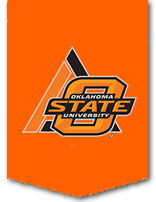DeWitt discusses eliminating abnormal prions during Food Safety Symposium
STILLWATER, Okla. – “Prions and Enterotoxins” was the theme of the recent Food & Agricultural Products Center's Food Safety Symposium.
Christina DeWitt, animal science assistant professor for Oklahoma State University, was one of six presenters during the symposium. DeWitt discussed a proposal to eliminate abnormal prions from animal by-product.
"The ultimate goal of this project is to enhance the safety of animal by-products intended for use as animal feed or fertilizer," DeWitt said.
DeWitt explained that prions are proteinaceous infectious particles that lack nucleic acids. Some proposed methods to reduce infectivity include bubbling fluidized bed, alkaline protein hydrolysis, high-pressure steam, ultra-high pressure, branched polyamines and enzyme degradation.
DeWitt's research project is broken down into four phases. The first phase includes obtaining BSL2 status for her lab and approval for importation of scrapie material. This phase is currently underway.
Phase two consists of verifying that processing does not produce false positives. The needs for this phase includes a brain stem from sheep verified as scrapie free and Western Blot analysis. This phase is scheduled to begin this July.
Phase three is planned to begin in November and will apply the process on a lab scale. A scrapie-positive brain stem is needed for this phase.
If results from phase three indicate protein fraction recovered from the process is negative for scrapie, the final phase will include evaluating the mixed model and verifying through mouse studies.
Stanley Gilliland, FAPC food microbiologist and chair of the symposium, said DeWitt's presentation gave a great example of research dealing with food safety.
“Dr. DeWitt’s knowledge of food science coupled with her working experiences provided relevant information for the symposium,” Gilliland said.
- ### -
Oklahoma State University, U.S. Department of Agriculture, State and Local Governments Cooperating. The Oklahoma Cooperative Extension Service offers its programs to all eligible persons regardless of race, color, national origin, religion, sex, age, disability, or status as a veteran, and is an equal opportunity employer.

